Automation Marketing Strategy: Boost Your ROI

At Drop Cowboy, we’ve seen firsthand how an effective automation marketing strategy can transform businesses.
Automation marketing is revolutionizing the way companies engage with their customers, streamline their processes, and boost their return on investment.
In this post, we’ll explore the key components of a successful automation marketing strategy and show you how to implement it for maximum impact.
What Is Automation Marketing?
The Game-Changing Power of Automation
Automation marketing transforms the way companies engage with customers, streamline processes, and boost return on investment. It uses software to handle repetitive marketing tasks, allowing your team to focus on strategy and creativity.
Personalization at Scale
Automation marketing enables you to send personalized emails to thousands of customers at the perfect time, without manual intervention. It’s not just about time-saving; it’s about delivering the right message to the right person at the right moment.
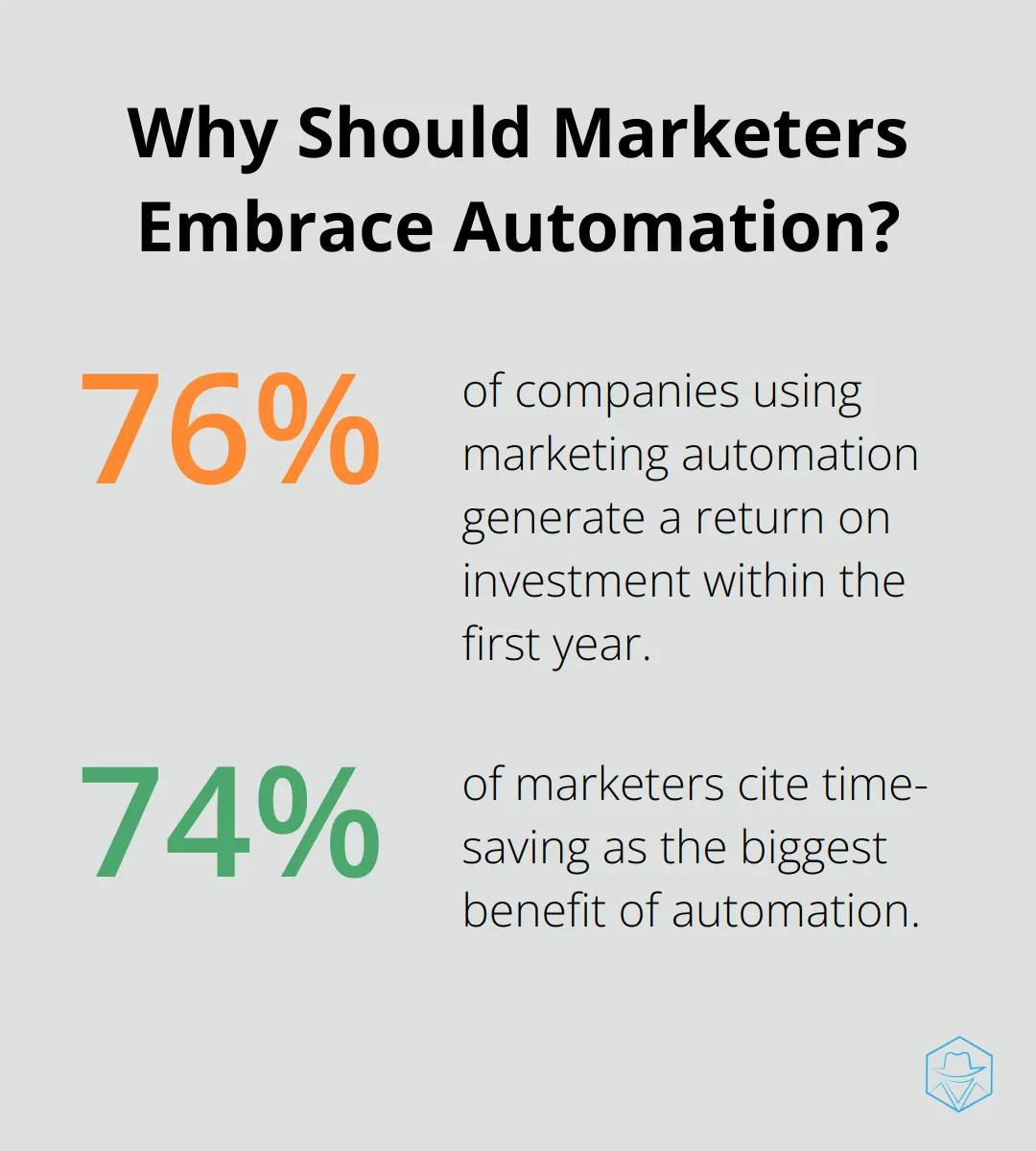
A study by Epsilon reveals that automated emails generate 70.5% higher open rates and 152% higher click-through rates than traditional marketing messages. These statistics highlight the immense potential of automation in engaging your audience effectively.
Key Ingredients for Success
To create a successful automation marketing strategy, you need three main components:
- Data: Collect and analyze customer information to understand behaviors and preferences.
- Tools: Select the right automation platforms that fit your business needs.
- Content: Create compelling messages that resonate with your audience at different journey stages.
HubSpot reports that 76% of companies using marketing automation generate a return on investment within the first year (a statistic that underscores the importance of a well-planned automation strategy).
Tangible Benefits of Automation
Implementing automation in your marketing campaigns leads to significant advantages:
- Time and Resource Savings: Adestra found that 74% of marketers cite time-saving as the biggest benefit of automation.
- Improved Lead Quality: The Annuitas Group reports that businesses using marketing automation to nurture prospects experience a 451% increase in qualified leads.
- Scalable Marketing Efforts: Automation allows you to reach more customers effectively without proportionally increasing costs.
Leveraging AI for Enhanced Engagement
Advanced automation tools now incorporate AI technology to further personalize and optimize marketing efforts. For example, Drop Cowboy’s Mimic AI™ technology allows for personalized voice messages at scale, significantly boosting engagement rates.
As we move forward, let’s explore how to build an effective automation marketing strategy that will propel your business to new heights.
How to Create a Winning Automation Marketing Strategy
Know Your Audience Inside Out
The foundation of any successful marketing strategy is a deep understanding of your target audience. Create detailed buyer personas that go beyond basic demographics. Analyze your customers’ online behavior, preferences, and pain points. Use tools like Google Analytics and social media insights to gather this data.
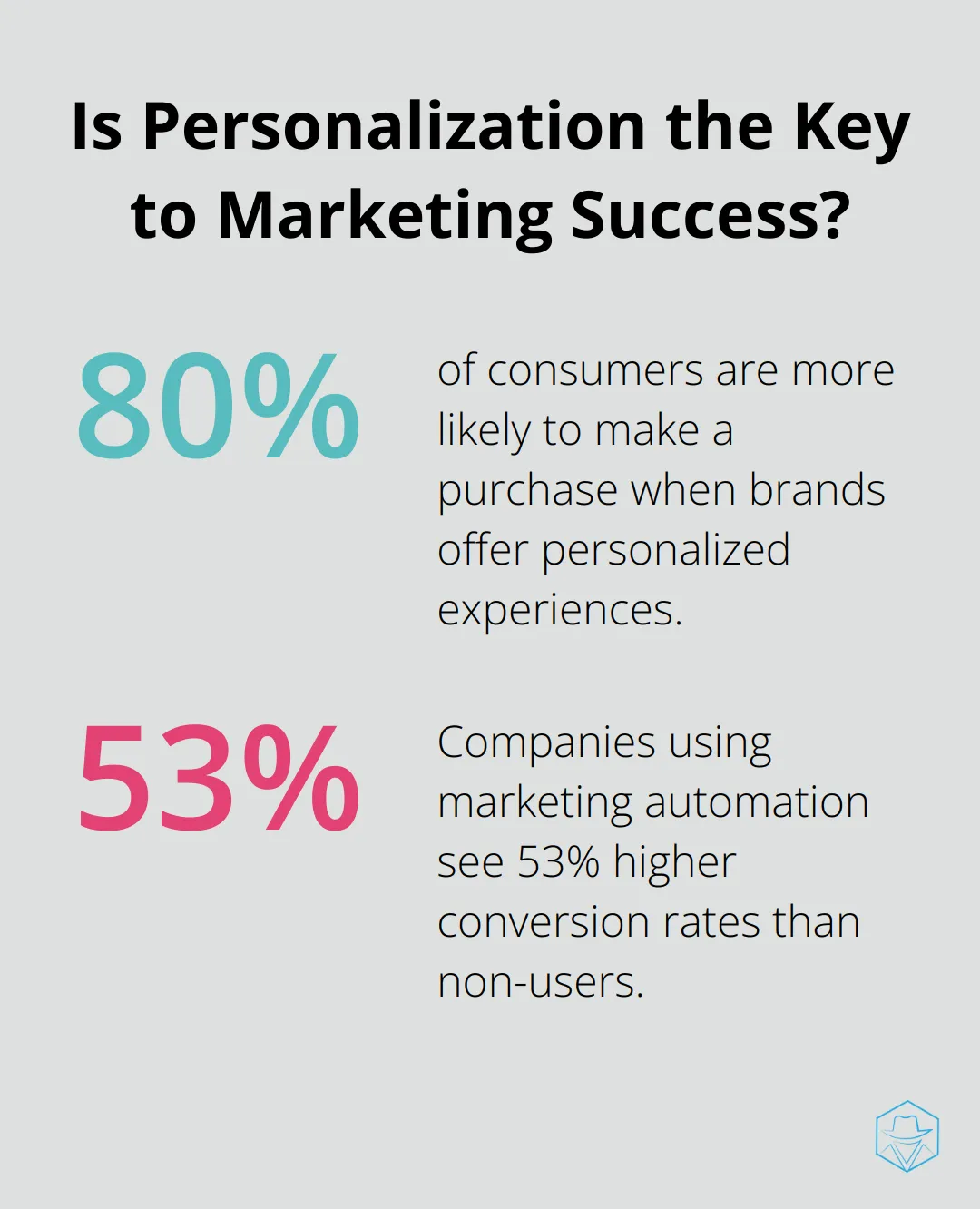
A study by Salesforce found that 76% of consumers expect companies to understand their needs and expectations. Leverage this understanding in your automation strategy to create more relevant and engaging campaigns.
Choose Your Automation Tools Wisely
Selecting the right automation tools can make or break your strategy. Look for platforms that integrate seamlessly with your existing systems and offer the features you need. Some key functionalities to consider include email marketing, lead scoring, CRM integration, and analytics.
While many options exist, Drop Cowboy offers a unique combination of ringless voicemail and SMS capabilities (powered by Mimic AI™ technology). This allows for highly personalized voice messages at scale, a feature that has shown to significantly boost engagement rates.
Craft Personalized Content for Every Stage
Focus on creating content that resonates with your audience at each stage of the buyer’s journey. According to a study by Epsilon, 80% of consumers are more likely to make a purchase when brands offer personalized experiences.
For the awareness stage, create educational content that addresses your audience’s pain points. In the consideration stage, offer comparison guides and case studies. For the decision stage, provide product demos and special offers.
Set Up Smart Triggers and Workflows
The power of automation lies in its ability to deliver the right message at the right time. Set up triggers based on specific user actions or behaviors. For example, when a lead downloads a whitepaper, automatically enroll them in a nurture email sequence.
Create workflows that guide leads through the funnel. A study by Nucleus Research found that marketing automation drives a 14.5% increase in sales productivity. Automating these processes frees up your team to focus on high-value tasks while ensuring no lead falls through the cracks.
Test, Measure, and Optimize Continuously
Creating an effective automation strategy is an ongoing process. Regularly test different elements of your campaigns, from email subject lines to landing page designs. Use A/B testing to identify what resonates best with your audience.
Monitor key metrics like open rates, click-through rates, and conversion rates. Use these insights to refine your strategy continually. A report by Invesp shows that companies using marketing automation see 53% higher conversion rates than non-users.
As you implement these strategies, you’ll start to see real results and a boost in your ROI. But how do you measure and optimize these efforts for maximum impact? Let’s explore that in the next section.
How to Measure and Optimize Your Automation Marketing
Track the Right KPIs
To understand the impact of your automation marketing, focus on metrics that directly affect your bottom line:
- Conversion Rate: Measure the percentage of leads that complete a desired action (e.g., making a purchase or signing up for a service).
- Customer Lifetime Value (CLV): Calculate how much a customer is worth over their entire relationship with your business.
- Return on Investment (ROI): Compare the revenue generated from your automation campaigns to the costs involved.
- Lead Velocity Rate: Monitor the growth in qualified leads month-over-month to indicate the health of your sales pipeline.
- Customer Acquisition Cost (CAC): Determine how much it costs to acquire a new customer to optimize your marketing spend.
Harness the Power of A/B Testing
A/B testing improves your automation marketing efforts. Here’s how to do it effectively:
- Test one element at a time: Change just one variable per test (e.g., email subject lines, call-to-action buttons, or landing page designs).
- Use a significant sample size: Ensure your test groups are large enough to provide statistically significant results (at least 1000 participants per variation).
- Run tests for an appropriate duration: Try to conduct tests for at least two weeks to account for variations in behavior over time.
- Implement the results: Once you have clear winners, apply the changes across your campaigns and start testing the next element.
Refine Your Strategy with Data
Analyze your data to refine your automation marketing strategy:
- Segment your audience: Break down your data by customer segments to identify which groups respond best to different types of content or offers.
- Analyze the customer journey: Use tools to understand how customers move through your funnel. Identify drop-off points and optimize those areas.
- Monitor engagement trends: Look for patterns in when your audience engages with your content most. Use this information to optimize send times.
- Use predictive analytics: Employ AI-powered tools to forecast future trends and behaviors based on historical data.
- Conduct regular audits: Every quarter, perform a deep dive into your automation workflows. Remove underperforming ones and update others based on your latest data insights.
Leverage Advanced Automation Tools
Consider using advanced automation tools to enhance your marketing efforts. For instance, platforms like Drop Cowboy offer unique features such as ringless voicemail and SMS capabilities (powered by Mimic AI™ technology). These tools allow for highly personalized voice messages at scale, which can significantly boost engagement rates.
Stay Compliant and Cost-Effective
Ensure your automation marketing strategy complies with relevant regulations. Some platforms (like Drop Cowboy) provide built-in compliance tools. Additionally, look for services that only charge for successful deliveries, making your automation efforts more cost-effective.
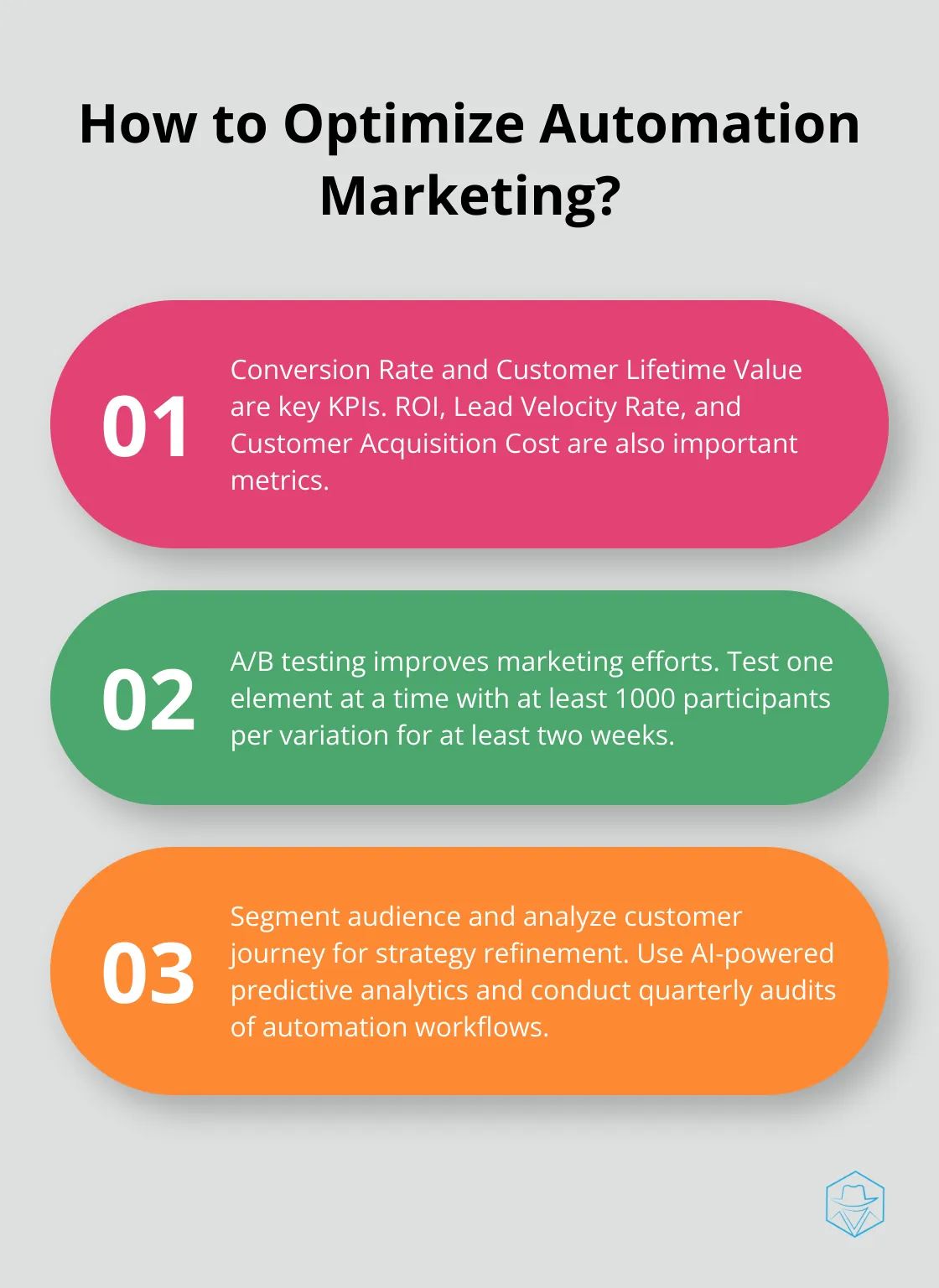
Final Thoughts
An effective automation marketing strategy revolutionizes business operations and boosts ROI. It delivers personalized experiences at scale, streamlines marketing processes, and focuses team efforts on high-value tasks that drive growth. Successful implementation requires a deep understanding of your audience, careful tool selection, and commitment to continuous optimization.
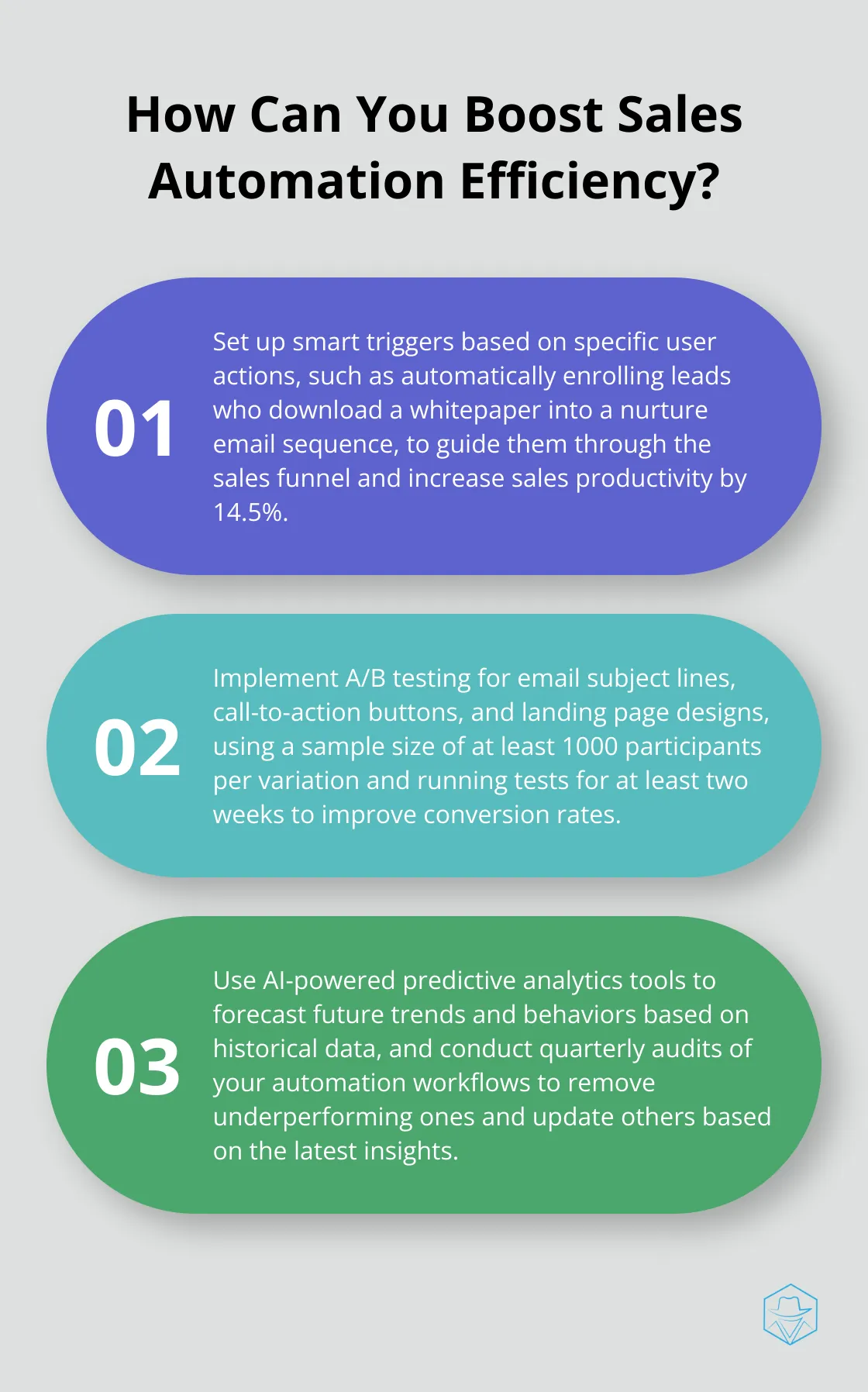
Automation marketing technology will become more sophisticated with advancements in artificial intelligence and machine learning. These developments will enable more precise targeting and personalization. Voice-activated technologies and augmented reality will play increasingly important roles in future automation marketing strategies.
Businesses that want to elevate their automation marketing should consider platforms like Drop Cowboy. With innovative features (such as ringless voicemail and SMS capabilities), Drop Cowboy provides unique ways to engage customers and improve campaign effectiveness. The future of marketing is automated, personalized, and data-driven.
blog-dropcowboy-com
Related posts
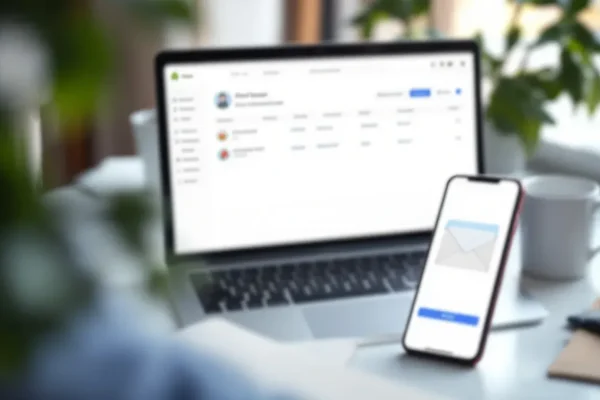
April 14, 2025
Crafting the Perfect Shopify Abandoned Cart Email
Boost sales by crafting the perfect Shopify abandoned cart email. Learn effective strategies to recover lost revenue today.

April 14, 2025
Triple Whale Pricing: What You Need to Know
Explore Triple Whale pricing insights, cost benefits, and practical tips for optimizing your budget with comprehensive analysis and real data.
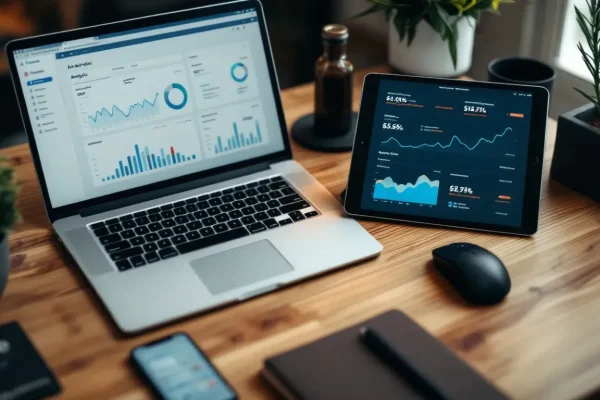
April 14, 2025
Top Triple Whale Alternatives for E-commerce Success
Explore top Triple Whale alternatives to boost your e-commerce success. Find the best tools and strategies to enhance online sales and customer engagement.

March 11, 2025
Send Appointment Reminders with Voice Broadcast
Boost efficiency with Voice Broadcast for appointment reminders. Reduce no-shows and enhance communication using this effective strategy.

March 19, 2025
Best Twilio Alternatives for Your Communication Needs
Discover the best alternative Twilio options to enhance your communication strategy. Explore top tools for effective messaging and calls.
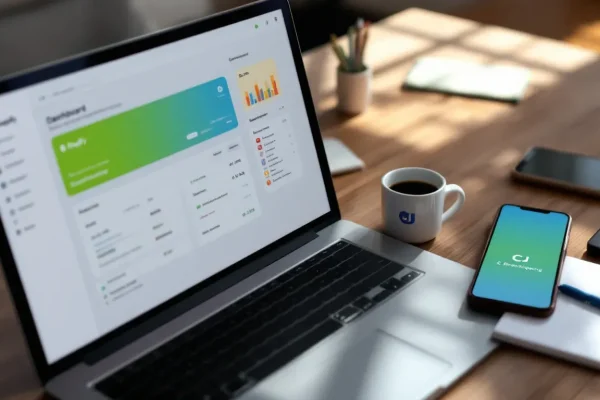
April 14, 2025
How to Integrate CJ Dropshipping with Shopify
Integrate CJ Dropshipping with Shopify easily and boost your e-commerce success. Get practical tips and seamless solutions for your online store today.